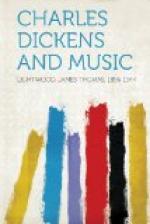O God, who by Thy Prophet’s
hand
Did’st smite
the rocky brake,
Whence water came at Thy command
Thy people’s
thirst to slake,
Strike, now, upon this granite
wall,
Stern, obdurate,
and high;
And let some drop of pity
fall
For us who starve
and die!
We find the fondness for Italian names shown by vocalists and pianists humorously parodied in such self-evident forms as Jacksonini, Signora Marra Boni, and Billsmethi. Banjo Bones is a self-evident nom d’occasion, and the high-sounding name of Rinaldo di Velasco ill befits the giant Pickleson (Dr. M.), who had a little head and less in it. As it was essential that the Miss Crumptons of Minerva House should have an Italian master for their pupils, we find Signer Lobskini introduced, while the modern rage for Russian musicians is to some extent anticipated in Major Tpschoffki of the Imperial Bulgraderian Brigade (G.S.). His real name, if he ever had one, is said to have been Stakes.
Dickens has little to say about the music of his time, but in the reprinted paper called Old Lamps for New Ones (written in 1850), which is a strong condemnation of pre-Raphaelism in art, he attacks a similar movement in regard to music, and makes much fun of the Brotherhood. He detects their influence in things musical, and writes thus:
In Music a retrogressive step in which there is much hope, has been taken. The P.A.B., or pre-Agincourt Brotherhood, has arisen, nobly devoted to consign to oblivion Mozart, Beethoven, Handel, and every other such ridiculous reputation, and to fix its Millennium (as its name implies) before the date of the first regular musical composition known to have been achieved in England. As this institution has not yet commenced active operations, it remains to be seen whether the Royal Academy of Music will be a worthy sister of the Royal Academy of Art, and admit this enterprising body to its orchestra. We have it, on the best authority, that its compositions will be quite as rough and discordant as the real old original.
Fourteen years later he makes use of a well-known phrase in writing to his friend Wills (October 8, 1864) in reference to the proofs of an article.
I have gone through the number carefully, and have been down upon Chorley’s paper in particular, which was a ‘little bit’ too personal. It is all right now and good, and them’s my sentiments too of the Music of the Future.[8]
Although there was little movement in this direction when Dickens wrote this, the paragraph makes interesting reading nowadays in view of some musical tendencies in certain quarters.
[1] In his speech at Birmingham on ‘Literature
and Art’
(1853) he makes special
reference to the ’great music
of Mendelssohn.’
[2] Moore’s Irish Melodies.
[3] Moore.




